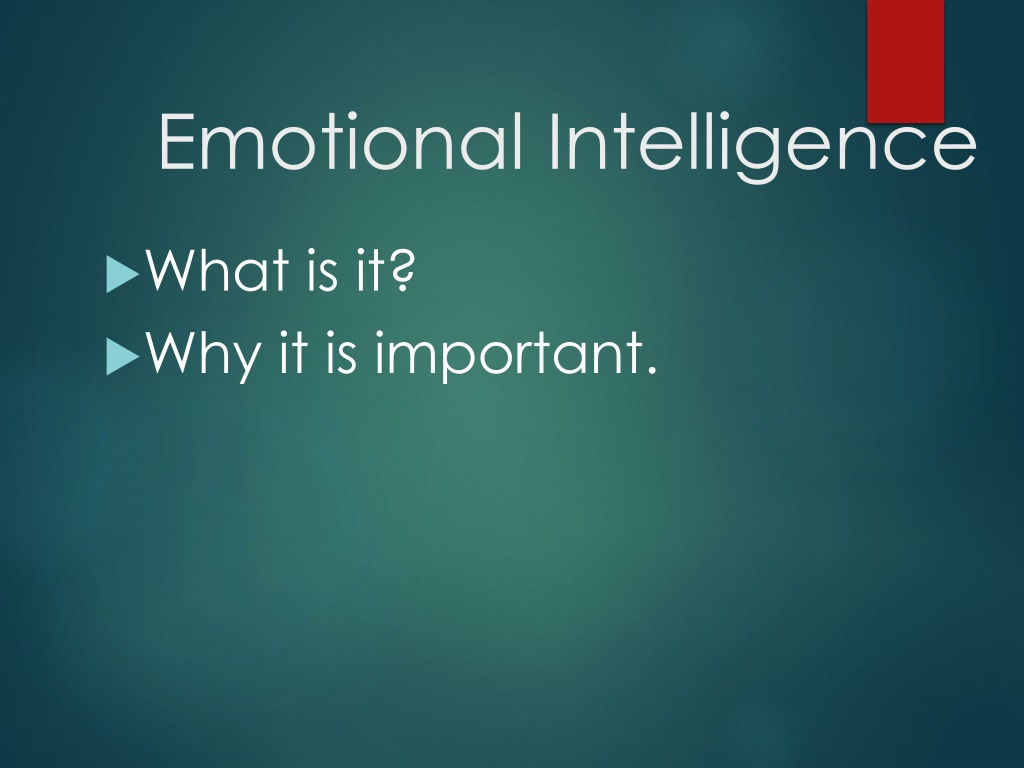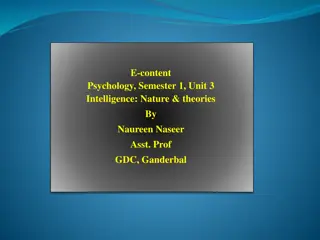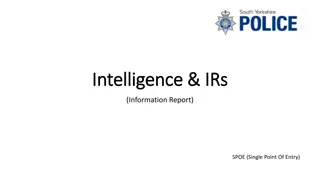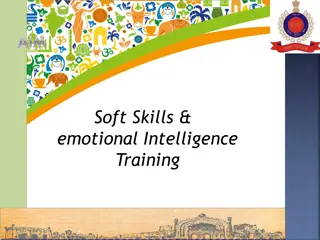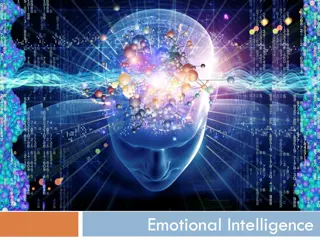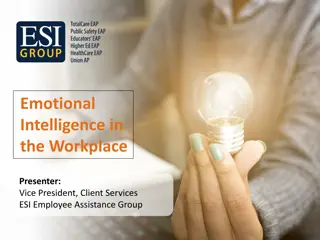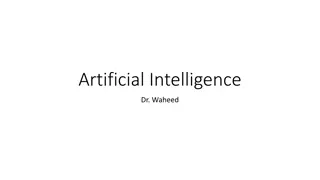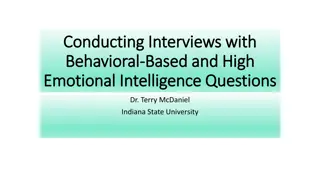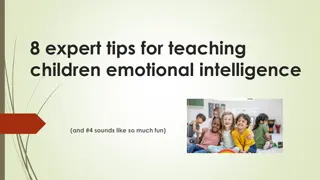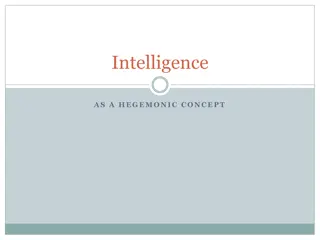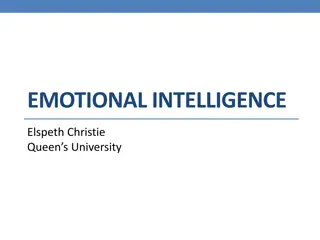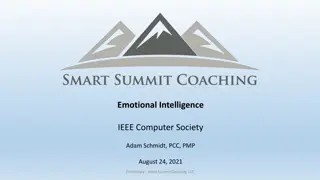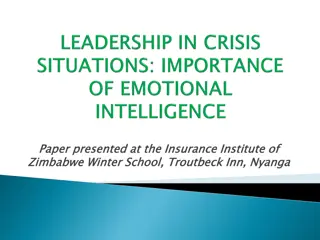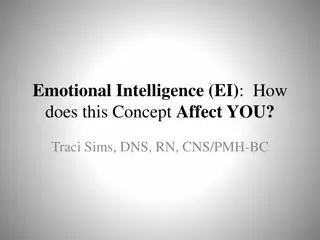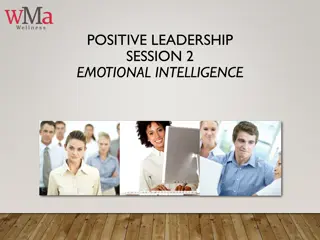Understanding Emotional Intelligence: Definition, Importance, and Examples
Emotional intelligence, a term that originated in the 1960s, refers to the ability to recognize and manage emotions in oneself and others effectively. It involves identifying emotions, understanding their impact, and using this awareness to guide behavior. Emotional intelligence is crucial for personal growth, successful relationships, and professional success. This concept has gained prominence since the 1990s and is essential for navigating various emotions such as affection, anger, happiness, and more. Evolutionarily, emotions play a vital role in survival, shaping our responses and behaviors. Recognizing and harnessing emotional intelligence can lead to better decision-making and overall well-being.
Download Presentation

Please find below an Image/Link to download the presentation.
The content on the website is provided AS IS for your information and personal use only. It may not be sold, licensed, or shared on other websites without obtaining consent from the author. Download presentation by click this link. If you encounter any issues during the download, it is possible that the publisher has removed the file from their server.
E N D
Presentation Transcript
Emotional Intelligence What is it? Why it is important.
A Little History The term Emotional Intelligence first appeared in a 1964 paper by Michael Beldoch. The term continued to appear in various articles. This area of study started to gain more traction in the 1990 s. Peter Salvoy and John Mayer published a scholarly article in 1993. In 1995 Danial Goleman authored the ground breaking book, EMOTIONAL INTELLIGENCE : why it can matter more than IQ.
What is Emotional Intelligence? The capability of individuals to: 1. Recognize their own emotions. 2.Recognize the emotions of others. 3.Tell the difference between feelings. 4. Label them appropriately. 5.Use this information to guide thinking and behavior, 6.Adjust emotions to achieve goals.(*) (*) https://en.wikipedia.org/wiki/Emotional_intelligence
What is Emotional Intelligence? Put more simply: Emotional Intelligence is the ability to make emotions work for you instead of against you. (*) (*) https://www.inc.com/justin-bariso/what-is- emotional-intelligence-exactly-heres-the... May 29, 2017
Emotions The Oxford English Dictionary defines emotion as any agitation or disturbance of mind, feeling , passion; any vehement or excited mental state. I take emotion to refer to a feeling , and its distinctive thoughts, psychological and biological states, and range of propensities to act. (*) (*) . Daniel Goldman, 1995) Emotional Intelligence , Bantam, (ISBN 0-553=37506- 7)pg289.
Examples From Wikipedia, Examples Affection, Anger, Annoyance, Apathy Depression Despair, Disgust Fear Happiness Sadness Shame, Guilt Worry Love Surprise or shock And more
Why do we experience emotions ? Automatic reaction of this sort have become etched in our nervous system, evolutionary biologist presume, because for a long and curial period they made the difference between survival and death. (*) The primitive brain did not think or learn, but developed regulators that kept the body running to ensure survival. The fact that the Thinking brain grew from the emotional reveals much about the relationship of thought to feeling ; there was an emotional brain long before there was a rational one (**) (*). Daniel Goldman, 1995) Emotional Intelligence , Bantam, (ISBN 0-553=37506-7)pg 5. (**)Ibid. pg 10
Two Minds In a very real sense we have two minds, one that thinks and one that feels (*) Information travel through the limbic system in the brain to where rational thinking takes place. You experience feelings first.(**) (*). Daniel Goldman, 1995) Emotional Intelligence , Bantam, (ISBN 0-553=37506- 7)pg8. (**) Bradberry, Travis, and Greaves, Jean. (2003) the Emotional Intelligence Quick Book. Fireside(ISBN 0-7432-7326-5) p 12.
Why do we care? It is estimated that more than 60 percent of success in business comes from the use of emotional competence(EC). In addition, losses of more than $10 billion per year nationwide are estimated to result from lack of EC. (*) (*)DeLorenzo; Luskin; Robins.Shani, (Mar/Apr 2010) Emotional Competence in Practice Management Journal of Financial Planning; Accounting and Tax periodicals pg22
The Business Case for Emotional Intelligence Why Emotional Intelligence is relevant. From the Consortium for Research for Emotional Intelligence in Organization Points to consider : 1. U.S Air Force used EQ-I to select recruiters. The gain was an annual savings of $3 millions Richard Handley and Reuven Bar-On provided this information). 2.Experienced partners of a consulting firm were assessed on EI. Those scoring above nine delivered $1.2 million more profit (Boyatzis 1990).
More points 3. Analysis of more than 300 top executives showed six emotional competencies distinguished stars from the average(Spencer, L.M., Jr., 1997). 4.In jobs of medium complexities a top performer is 12 times more productive than bottom(Hunter, Schmidt & Judiesch,1990). 5. At L Oreal sales agents selected on the basis of certain emotional competencies significantly out sold salesman selected by old methods (Spencer & Spencer, 1993, Spencer, McClelland, Kelner, 1997).
More Business Cases Executives and president with strong emotional intelligence enjoy greater success. Financial advisors at American Express whose managers completed Emotional Competencies program were compared to advisors whose managers did not. The first group grew their business at a greater rate. (*). (*) Chermiss, Cary, (1999).The Business case for Emotional Intelligence The Consortium for Research for Emotional Intelligence in Organization
Emotional Intelligence Skills Self Awareness Self Management Social awareness Relationship management(*) 1. 2. 3. 4. (*)Bradberry, Travis, and Greaves, Jean. (2003) the Emotional Intelligence Quick Book. Fireside(ISBN 0- 7432-7326-5)
Self Awareness Self-awareness is about understanding ourselves and knowing what pushes our buttons and why. (*) Emotions serve a purpose. Taking the time to think through them is key. (**) People with greater certainty about their feeling are better pilots of their lives. (***) (*) Dr. David Walton.(2012) Emotional Intelligence . MJF Books(ISBN978-1-60671 278-8)pg. 25 (**). Bradberry, Travis, and Greaves, Jean. (2003) the Emotional Intelligence Quick Book. Fireside(ISBN 0- 7432-7326-5) (***) . Daniel Goldman. (1995) Emotional Intelligence , Bantam, (ISBN 0-553=37506-7)
Self Management When to act or not to act. Very dependent on your self awareness Managing your emotional reaction to situations and people. Some emotion reactions to situations can create a paralyzing fear The ability to tolerate an exploration of your emotions. (*) (*)Bradberry, Travis, and Greaves, Jean. (2003) the Emotional Intelligence Quick Book. Fireside(ISBN 0- 7432-7326-5)
Social Awareness The ability to pick up on the emotions of others and understand them. Perceiving how others feel and how they are thinking Not just understanding your emotions, but the emotional reactions of others and how it is affecting their thinking(*) (*)Bradberry, Travis, and Greaves, Jean. (2003) the Emotional Intelligence Quick Book. Fireside(ISBN 0-7432-7326-5
Understanding Others Understanding other people involves first deciding to switch your attention away from yourself. (*) An ancient proverb: Before criticizing a man, walk a mile in their moccasins. (*) Dr. David Walton.(2012) Emotional Intelligence . MJF Books(ISBN978-1-60671 278- 8)pg. 71
Relationship Management Ensures clear communication and effective handling of conflict. People who manage relationships well are committed to their value, and are able to see the benefit of connecting with different people, even those they are not fond of (*) Show people you value them. (**) (*)Bradberry, Travis, and Greaves, Jean. (2003) the Emotional Intelligence Quick Book. Fireside(ISBN 0-7432-7326-5) (**) Dr. David Walton.(2012) Emotional Intelligence . MJF Books(ISBN978-1-60671 278- 8)pg. 91
Relationship Management Aristotle s Challenge Anyone can become angry- that is easy. But to be angry with the right person, to the right degree, at the right time , for the right purpose, and in the right way-this is not easy. Aristotle, The Nicomachean Ethics (*) . (**)Daniel Goldman, 1995) Emotional Intelligence , Bantam, (ISBN 0-553=37506-7)
A Slightly different Delineation Five domains: 1. Knowing one s emotions. 2. Managing emotions 3.Motivating oneself 4. Recognizing emotions in others 5. Handling relationships(*) (*)Daniel Goldman, 1995) Emotional Intelligence , Bantam, (ISBN 0-553=37506- 7)
Said Another Way The Four Branch Model 1.Perceiving Emotion 2.Using Emotion to facilitate thought 3. Understanding Emotions 4. Managing Emotions (*) (*) Mayer & Salovey, 1997, down loaded from www.unh.edu/ emotional _ intelligence/
So What ! Are you a slave to your emotions? Do you find your emotions controlling your decision making process ? Do other peoples emotions create reactions to your emotions ? Are there times when you look back on a day, a situation or an event and say why did I do, or say what I did? You are not alone. IQ doesn t change, but EQ can!
Your Brain is Plastic The cells in your brain grow new ways to communicate with one another in response to changing circumstances. Neurological term Plasticity your emotional intelligence is a product of the amount of communication between the rational and emotional centers of your brain. When you practice emotional intelligence skills, you strengthen this pathway, Your cells literally branch out and grow connections between you feeling and your reason but it takes time. (*) (*) Bradberry, Travis, and Greaves, Jean. (2003) the Emotional Intelligence Quick Book. Fireside(ISBN 0- 7432-7326-5)
A Fast Growing Job Skill * According to the World Economic Forum s Future of Jobs, emotional intelligence will be one of the top ten job skills by 2020. *Harvey Deutschendorf, 7 Reasons Why Emotional Intelligence Is One Of The Fastest- Growing Job Skills , Fast Company, 05/14/2016. https://www.fastcompany.com/3059481/7- reasons-why-emotional-intelligence-is-one-of-the- fastest-growing-job-skills
A Fast Growing Job Skill * 1. THEY CAN HANDLE PRESSURE HEALTHILY 2. THEY UNDERSTAND AND COOPERATE WITH OTHERS 3. THEY RE GOOD LISTENERS 4. THEY RE MORE OPEN TO FEEDBACK 5. THEY RE EMPATHETIC 6. THEY SET AN EXAMPLE FOR OTHERS TO FOLLOW 7. THEY MAKE MORE THOUGHTFUL AND THOROUGH DECISIONS *IBID.
Signs of High Emotional Intelligence. What are the signs of High Emotional Intelligence?
Signs of High Emotional Intelligence. Mark Murphy, 5 Signs of High Emotional Intelligence, Forbes Magazine, 05/08/2016. https://www.forbes.com/sites/markmurphy/2016/ 05/08/5-signs-of-high-emotional- intelligence/#2b8a15bc7e48 Justin Bariso, 13 Signs of High Emotional Intelligence, Inc., https://www.inc.com/justin- bariso/13-things-emotionally-intelligent-people- do.html
Signs of High Emotional Intelligence. Daniel Wallen, 15 Signs That You Are Emotionally Intelligence, LifeHack. https://www.lifehack.org/articles/communication /15-signs-that-you-are-emotionally-intelligent.html Travis Bradberry, 18 Signs That You Have High Emotional Intelligence, Success Magazine. https://www.success.com/18-signs-you-have- high-emotional-intelligence/ Jayson Demers, 7 Signs You are An Emotionally Intelligent Person, Entrepreneur. https://www.entrepreneur.com/article/293826
Signs of Low Emotional Intelligence. Kendra Cherry, verywell mind , *1. Getting Lots of Arguments 2. Not Understanding How Others Feel. 3. Thinking That Other People Are Overly Sensitive. 4. Refusing to Listen to Others Point Of View. 5. Blaming Others for Mistakes.
Signs of Low Emotional Intelligence. 6. An Inability to Cope With Emotionally Charged Situations. 7. Sudden Emotional Out Burst. 8. Difficulty Maintaining Friendships. 9. Lack of Empathy. *Kendra Cherry, 9 Signs of Low Emotional Intelligence, verywell Mind, Updated July 25, 2019. https://www.verywellmind.com/signs-of-low- emotional-intelligence-2795958
What to Do? Don t be a Mr. Spock!
Five Hacks you need 1.Take more Pauses Pause think before you react 2. Be mindful Live the moment, notice small things, like your breathing 3. Journal Write about what you feel 4. Watch facial cues. 5. Map emotional triggers. https://www.inc.com/larry-alton/5-hacks-to-improve-your- emotional-intelligence-and-why-you-need-them.html
Emotionally Intelligent Teams *1. Chunking Information. 2. Ignoring Mental Chatter. 3. Checking in with Reality. 4. Acknowledging What You Can Control. 5. Shifting Your Attention. * Srini Pillay, The Simple 5-step process to creating emotionally intelligent teams, FastCompany.com. https://www.fastcompany.com/90382424/how- to-build-emotional-intelligence-at- work?partner=feedburner
Emotional Intelligence 25 Years later
Emotional Intelligence Have we progressed as a society? Do we see emotional Intelligence exercised more by our National Leaders?
